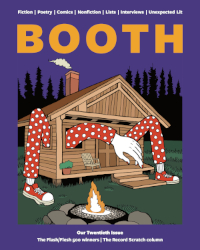Fiction by Matt Bell
Years before the abandonment was announced, the older had already been building the dollhouse for the younger, and so the younger said she would not give herself up to be left until she was allowed to play with it just once. When at last it was complete, the parents granted the younger a mere hour to play, after which they promised the sisters would both be taken away. But in the odd ticking of that hour the younger found a new world, one of fast incident tucked inside slow time, and inside the dollhouse each room was complete with tiny furniture, each closet stocked with tiny clothes that fit the paper dolls she found sleeping in the beds, one doll for the older and one for the younger.
There were no dolls of her parents, and the younger found she did not care. It was not her parents she loved. It was not her parents she had dreamed of moving through the rooms of the dollhouse.
In fact, she was glad her parents were gone, she realized, as she pressed a knuckle of coal into the miniature working stove, as she shuttered the windows against the coming storm the older let fall from a water can held above the house. What delight, to be in such a well-built house, even if only in play! There was a tiny mirror in the bedroom that was like the younger’s bedroom—the one she shared with the older child—and when the younger put her eye to the window she could see her eye reflected in the mirror hung on that room’s wall, her eye reflected as big as a god’s, seeming to stare down at the dolls while they slept in their tiny nightshirts.
The younger watched a long time. She had known hunger and cold, but now she thought she knew happiness too. She thought she could give her happiness to the doll younger, to the doll older, by watching them and loving them. She had been promised only an hour, but now she thought that hour skipped, stuttered, grew long. It was not real time but story time, imagined time, and when at last the tap on her shoulder came, the younger sighed, because now she knew it was another time, time for her and the older to be taken to the woods, where they would be left.
One more look, she told herself. A look that lasts so long.
The younger doll was still sleeping, as was the older. This was in her imagination—they were only paper, after all—but it did not feel so. The younger thought she could see the movement of their dreams. The younger thought they could be made to sleep forever.
This was a good house, she thought, because it was made only for children. A younger and an older.
But when she thought the word younger, she had stopped knowing whether it meant her or her doll.
The tap on her shoulder returned, and so the younger took her eye away from the window—slowly, so that she could watch the god-eye escape the bedroom mirror—and when she stood and turned she found that she had to blink her eyes rapidly so they might readjust to the sunny playroom. The person who had tapped her was not her father or mother but a stranger to her, and for a moment the younger was afraid—afraid even though she knew what her mother and father had planned—until she understood that this person was her older, grown. The younger looked down at herself and saw that she was still a child, the same child she’d always been, beautiful and lovely and in dire need of saving. The new older smiled and took her small hand. This is one of the ways a child can be kept safe, the older said. And then in the other room the older showed the younger the bones of their parents, almost dust, still waiting in their bed for the younger to willingly agree to be abandoned by these people, the man and woman who had made her, who had once been meant to love her most, in a bigger and emptier house of their own.



